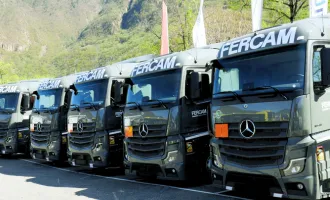

Recycling Heroes: The Logistics Industry’s Role
Every year on March 18th Global Recycling Day is celebrated to raise awareness about the importance of recycling and the many positive impacts on the environment. The dedicated day aims at encouraging people to take action by recycling more, reducing waste, and conserving natural resources. As key players in the movement of goods and material, logistics and transport companies can and must give their active contribution in finding sustainable recycling solutions.

In 2023, the theme for this reoccurring event is “Recycling Heroes”, which highlights the essential role that individuals, businesses, and organizations play in making rational use of resources and in waste reduction. Logistics and Transport companies play a big role in goods management processes, and it is, therefore, essential for them to adopt as many sustainable practices as possible. Some of these can include material waste limiting and upcycling, the use of eco-friendly packaging, and implementing Reverse Logistics solutions.
Waste reduction
Logistics and Transport companies can play a crucial role in adopting and promoting sustainable practices, such as waste reduction. One way to limit waste is by implementing the supply chain with a vision that includes measures to reduce, reuse, and recycle materials. This can include using reusable packaging, optimizing packaging size to reduce waste, and implementing recycling programs together with their partners to repurpose excess or unclaimed products.
Reverse Logistics
Reverse logistics refers to the process of returning goods from the end-user back to the manufacturer or retailer. This can include products that are defective, expired, or no longer needed by the customer. Instead of disposing of these products in a landfill, reverse logistics allows companies to recover materials, components, or products that can be reused or recycled. By supporting their customers in implementing a reverse logistics program, logistics and transport companies can minimize waste and help reduce customers’ carbon footprint.
Upcycling materials
Pallets are an essential component of logistics and transport operations because they provide a stable platform for moving goods. Among the different types in use, the disposable or single-use pallet is widespread. Unlike the reusable version, which is returned to the customer after transportation operations are completed, this wooden disposable pallet ends its life cycle after its first use. Upcycling this wood represents a sustainable alternative that can help reduce waste and prolong the life of the material. Instead of disposing of these pallets, companies can reuse them to build new products such as furniture, planters, or even works of art. Upcycling pallets not only reduces waste but can also be a cost-effective solution as companies can avoid purchasing new materials for their upcycling projects. This same mindset can also be applied to other commonly used objects and materials along the supply chain, such as containers and crates, packaging materials, etc.
As consumers increasingly demand environmentally responsible practices, it is essential for logistics and transport companies to take a proactive approach towards more sustainable solutions. By implementing these measures, companies in this field can reduce their environmental footprint, save costs, and improve their overall sustainability performance.
FERCAM’s initiatives for a circular economy
FERCAM is committed to promoting and investing in sustainable solutions for Clean, Smarter Logistics. In fact, during the latest years, we have significantly increased actions that actively contribute to reducing the carbon footprint of our operations. Some of these include important agreements with partners that share our vision, kick-off upcycling projects, reuse of water resources, promotion of initiatives to reduce waste production, and of course material recycling initiatives.
We have partnered up with Tecnica, one of the most important brands in the world market of sports footwear, to transform old ski boots into second-generation material. The Recycle Your Boots initiative stems from the awareness of the problem linked to the production of waste and its disposal: all those who need to buy a new pair of ski boots are offered to return the old ones. With a transparent and sustainable process, all the materials that make up the boots are then recovered and reworked.
FERCAM has also signed an agreement with Regusto to optimize the donation processes of products at risk of waste, food and non-food. Whilst FERCAM creates a bridge between its partners or customers of the supply chain and non-profit beneficiary companies, Regusto employs its owned platform to track and secure donation processes in a way that is transparent, traceable and affordable for everyone.
In 2021 FERCAM Echo Labs was born: the non-profit company of the Group supports solid and scalable initiatives that have positive socio-environmental impacts. This reality is dedicated to the recovery of waste materials from logistics and transport operations, such as pallets, Fine Art crates, containers and more, and upcycles them into different useful objects and structures, such as furniture, flooring or exhibition stands. By repurposing materials that would otherwise go to waste, Echo Labs is contributing to a more sustainable future and demonstrating the possibilities of a circular economy.





























